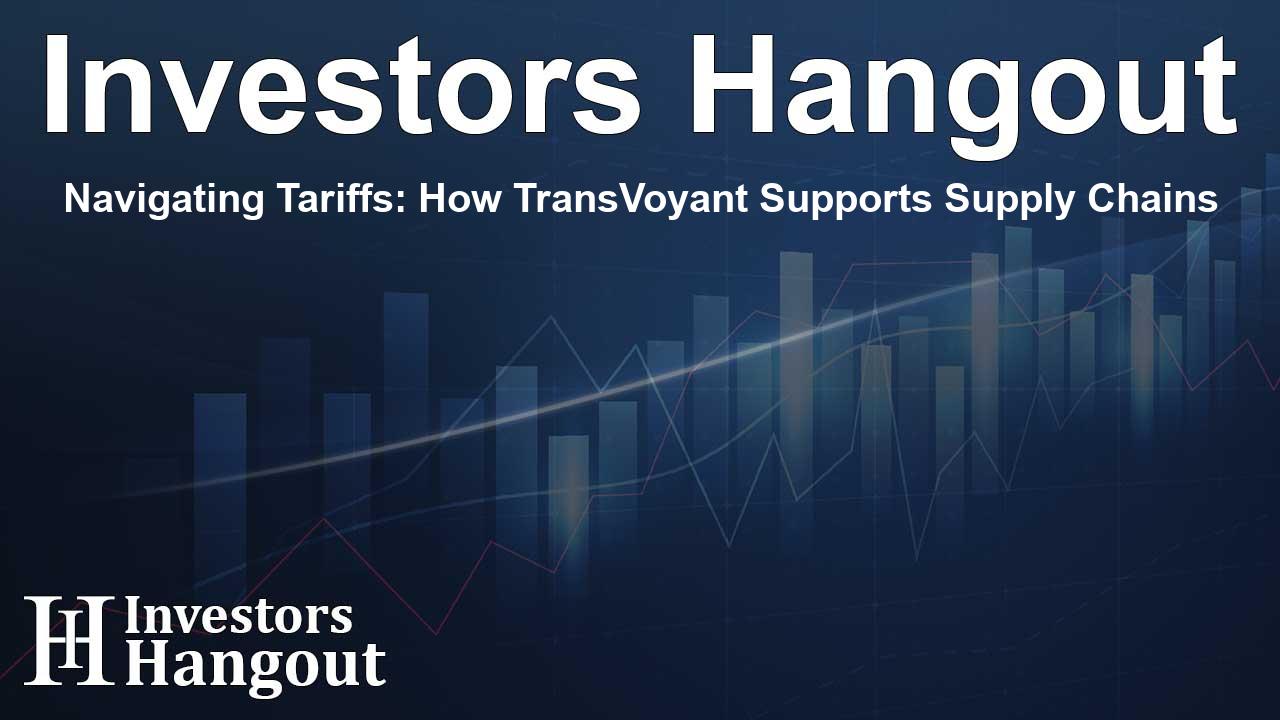Navigating Tariffs: How TransVoyant Supports Supply Chains

Understanding the Impacts of Tariffs on Global Supply Chains
In today's world, geopolitics plays a significant role in the functioning of supply chains. With impending tariff deadlines and escalating trade tensions, organizations are under pressure to respond swiftly. This scenario emphasizes the need for a proactive approach, turning what was once considered a predictable operation into a complex challenge.
The Urgency of the August 1 Tariff Deadline
As the August 1 deadline approaches, businesses face potential disruptions ranging from increased transportation costs to significant delays in shipping. Industry experts warn that these tariff changes could ignite further demand shifts and compel companies to reevaluate their sourcing strategies to maintain efficiency in their supply chains.
The Rise of Geopolitical Risks
Recent policies have resulted in tariffs of up to 30% on imports, particularly from China, while significant duties on goods from Canada and Mexico further complicate matters. These developments have already stressed logistics networks and created bottlenecks at major ports. The ensuing chaos demands a reevaluation of traditional supply chain strategies in favor of more agile, responsive systems.
The Role of TransVoyant
TransVoyant emerges as a key player in this changing landscape, offering solutions that address these challenges head-on. The company provides crucial real-time insights that help businesses manage uncertainty effectively. Their Continuous Decision Intelligence™ (CDI) platform collects and analyzes global data, equipping companies with the tools needed to make swift, informed decisions.
Real-time Intelligence as a Strategic Advantage
Modern supply chains require comprehensive visibility into operations. TransVoyant's CDI platform enables companies to anticipate disruptions such as port congestion and labor strikes, facilitating proactive adjustments to logistics plans. This capability is essential for businesses aiming to secure their operational continuity amid mounting geopolitical pressures.
Enhancing Operational Efficiency
An essential feature of the CDI platform includes its predictive analytics, which allow businesses to simulate various scenarios, preparing them for potential disruptions. In a recent case study, clients who leveraged these insights managed to reposition their inventory efficiently and stave off the impacts of upcoming tariff changes.
Case Study: Successful Mitigation Through Predictive Insights
Earlier this year, several global customers utilized TransVoyant's tools to enhance their inventory positioning. These organizations successfully identified opportunities for rerouting shipments and managed to mitigate the impending effects of tariff changes by optimizing their supply chains ahead of time.
The Need for Adaptability in Modern Supply Chains
With surveys indicating that a large majority of supply chain leaders recognize geopolitical instability as a major risk, it remains concerning that a minority have adopted real-time decision-making tools. As businesses navigate uncertainty, integrating platforms like TransVoyant's can differentiate between those who thrive and those who struggle in an unpredictable environment.
Conclusion: The Future of Supply Chain Management
The looming tariff deadline signifies more than just a financial hurdle; it represents a catalyst for transformation in how businesses approach supply chain management. Companies must prioritize adopting holistic strategies that incorporate forward-thinking technologies. By leveraging the insights offered by TransVoyant, organizations can enhance their agility and responsiveness, ensuring resilience during fluctuating market conditions.
Frequently Asked Questions
What is the significance of the August 1 tariff deadline?
The August 1 tariff deadline poses potential disruptions for supply chains, affecting costs, logistics, and sourcing strategies.
How does TransVoyant aid in navigating supply chain challenges?
TransVoyant provides real-time, predictive insights that help organizations anticipate and respond to supply chain disruptions.
What is Continuous Decision Intelligence™?
Continuous Decision Intelligence™ (CDI) is TransVoyant's proprietary platform that integrates live data with analytics to forecast and manage supply chain dynamics.
Why are geopolitical risks important for supply chains?
Geopolitical risks can lead to unexpected tariff changes and market disruptions, making it essential for supply chains to adapt and remain resilient.
What steps can companies take to enhance their supply chain resilience?
Companies can enhance resilience by adopting real-time analytics, strengthening logistics operations, and staying ahead of geopolitical developments.
About The Author
Contact Logan Wright privately here. Or send an email with ATTN: Logan Wright as the subject to contact@investorshangout.com.
About Investors Hangout
Investors Hangout is a leading online stock forum for financial discussion and learning, offering a wide range of free tools and resources. It draws in traders of all levels, who exchange market knowledge, investigate trading tactics, and keep an eye on industry developments in real time. Featuring financial articles, stock message boards, quotes, charts, company profiles, and live news updates. Through cooperative learning and a wealth of informational resources, it helps users from novices creating their first portfolios to experts honing their techniques. Join Investors Hangout today: https://investorshangout.com/
The content of this article is based on factual, publicly available information and does not represent legal, financial, or investment advice. Investors Hangout does not offer financial advice, and the author is not a licensed financial advisor. Consult a qualified advisor before making any financial or investment decisions based on this article. This article should not be considered advice to purchase, sell, or hold any securities or other investments. If any of the material provided here is inaccurate, please contact us for corrections.
